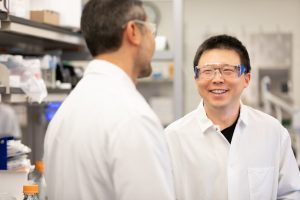Feng Zhang, PhD, institute member at the Broad Institute and HHMI Investigator, has an uncanny ability to be in the middle of (or on the leading edge of) the hottest topics in biological research. The pioneer of CRISPR gene editing was at the center of the research that created that field. Now, he has his sights set on a new goal—delivery. The delivery of genetic payloads into cells is a huge barrier to gene therapy and genomic medicines. It is a hurdle that, when cleared, could alter the course of that field.
In August 2021, Zhang’s group published a Science paper titled, “Mammalian retrovirus-like protein PEG10 packages its own mRNA and can be pseudotyped for mRNA delivery.” In it, they described how retroviral-like proteins found in the human genome form virus-like capsids that carry nucleic acids. They described the development of selective endogenous encapsidation for cellular delivery (or SEND) by engineering an LTR retrotransposon homolog (PEG10) to package, secrete, and deliver specific RNAs. The last line of the paper’s abstract noted that “these results demonstrate that SEND is a modular platform suited for development as an efficient therapeutic delivery modality.”

PNPs are human proteins with a retrotransposon origin. According to Akin Akinc, PhD, CEO of Aera Therapeutics, roughly 8% of our genome comes from mobile transposable elements. Further, 80 proteins in our genomes, he explained, are derived from mobile genetic elements. Some can perform other functions—for example, forming capsid-like structures that can transfer material from cell to cell. Previous results suggest that the PNP’s natural tropism can be leveraged. In addition, they can be engineered to have an altered tropism and target specific tissues.
Aera’s strategy is to harness these proteins, and structures, to move the cargo of genetic medicines: RNAi, antisense RNA, mRNA, or a genetic editing payload, for example. To date, proteins and nucleic acids have been packaged. The company’s first goal is to move smaller nucleic acids like ASOs and siRNA from cell to cell.
What is known about PNPs is “quite limited,” said Akinc. Their role in the human body is particularly opaque. The literature goes back only to 2018. They are called virus-like particles (VLPs) in the literature, but Aera thinks that PNP is a more technically accurate name.
Aera Therapeutics is announcing its launch today, they said, with “a vision to harness its proprietary delivery platform to unlock the potential of genetic medicines.” Akinc doesn’t specify any disease targets but emphasizes the unmet need for diseases that affect the central nervous system.
Aera is not limiting themselves to delivery. They think of themselves as “the whole package.”
“That doesn’t mean that we are going to do it all on our own,” noted Akinc. “There might be partnering in the future.”
Aera’s technology also includes a licensed therapeutic enzyme platform based on the discovery of novel, compact, and programmable gene-editing enzymes. The compact size of these enzymes may help overcome the packaging and delivery challenges of current gene editor systems.
“Everyone is working on delivery,” noted Akinc. But the company believes that it is the only company working on these proteins to deliver genetic medicines.
Aera houses 50 employees in the seaport district of Boston. After more than 19 years at Alnylam Pharmaceuticals, in Kendall Square, Akinc said he’s happy to find himself on the other side of the river.
The Romans used the word Aerarium for the public treasury. Why has this inspired the name of Feng Zhang’s new company? Because, Akinc noted, the company is founded around the discovery of human proteins that package genetic cargo. The proteins, he added, are “treasure in our genome.”


